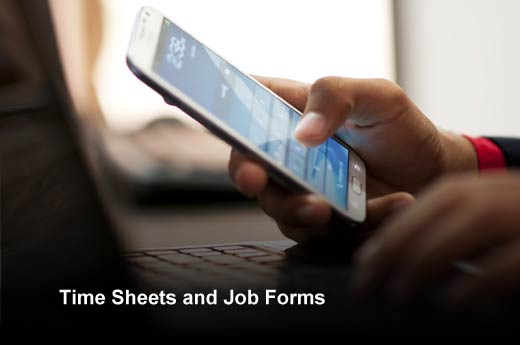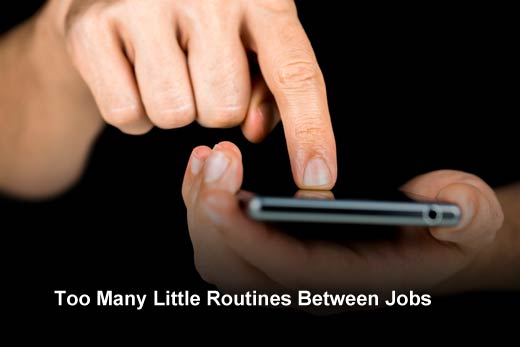We all know that happy workers provide better service. In the service industry, there is an even greater drive to create a happy customer experience — and a field worker’s unhappiness can easily turn into lost productivity and a damaging customer experience.
What if you could fix some of the things that your field workers hate? Mike Karlskind at ClickSoftware outlines five things that field workers hate, along with simple, actionable suggestions on how to fix them using mobile solutions. After all, happy workers lead to greater productivity, better service and a better customer experience — and that’s the bottom line.
Mobile Solutions for Workers on the Go
Click through for five things that field workers hate, along with simple, actionable suggestions on how to fix them using mobile solutions, as identified by Mike Karlskind at ClickSoftware.
Status Reporting
Status reporting is to field workers as sand is to oysters. Even though it’s irritating, it’s a necessary part of safety, productivity and optimization. There are many people who need to have a clear vision of what’s going on in the field. The dispatcher wants to know if engineers are on time, the supervisor wants the accountability of each worker, and management wants to know if customers are being taken care of in the most efficient manner.
It Works in Both Directions
With a mobile workforce management solution, engineers can easily let dispatchers and managers know the status of their job and what’s happening throughout the day.
For office personnel – simply glance at the schedule for any update and be confident that no job has been missed.
For field workers – quickly continue with the task at hand without disruptive phone calls and know that help can be sent immediately and schedules can be arranged to accommodate the situation.
Safety Is a Status Issue
Don’t forget the safety issues that surround a good mobility solution and status reporting. Dispatchers are concerned about not only getting the job done, but also keeping the field engineer safe.
By watching real-time job status updates and identifying exceptions and deviations from the schedule, dispatchers can offer help in many different ways:
- Send a spare or missing part
- Send assistance to finish a complicated job
- Reschedule the next task so the job doesn’t fall behind schedule
- Send help in an emergency situation
Time Sheets and Job Forms
Field engineers know that filling out time sheets and job forms is a lengthy process, so they usually put off doing them. This task becomes a burden that is done at home after a long day of work when exhaustion is setting in and the mind is going blank. Forms are haphazardly filled in, information is lost, forms are forgotten and jobs stay open for days just waiting for the proper paperwork to be completed. In some cases, engineers are paid according to the job type and amount, so forgotten or missing paperwork can result in an inaccurate payroll.
Forms in a Mobile Device
Mobility can play a big role in overcoming the barriers to paperwork and can simplify mundane tasks. With the ability to access forms and time sheets from the mobile device, engineers can write off jobs in three to five minutes instead of 30 minutes.
Engineers can focus more on the customer-care side, pay more attention to the job at hand and spend more time with the customer explaining the products.
By using forms in a mobile device, engineers can:
- Complete forms throughout the day as the job finishes
- Send forms to the dispatcher to start immediate processing
- Cut down on the backlog of paperwork and late-night sessions
By connecting the mobility solution to the company’s backend system, field-worker productivity can be improved further:
- Form fields can be populated with customer and job information automatically
- Billing and payroll accuracy can improve dramatically
- Data can be archived and retrieved instantly
Unsuitable Lunch Breaks
When it comes to lunch, most businesses allocate a certain amount of time for their employees to eat. This usually happens at the same time every day, for the same period of time. When it comes to field workers with a list of tasks to complete, however, taking a lunch break can cause complications. A daily schedule that doesn’t factor in lunch means that when an engineer stops to eat, he or she will deviate from the schedule. This, in turn, can cause missed SLAs, overtime costs and regulation violations.
Freedom to Lunch
A flexible lunch break is imperative to field workers who want to catch a bite to eat on their own terms throughout the day. Lunch breaks should be automatically scheduled at the beginning of the day and be viewed as a floating break that can be moved. Both engineers and dispatchers should have the freedom to reschedule this break according to the events of the day. If a job is taking longer than expected, the engineer can contact dispatch and reschedule the start-time of his or her lunch break, and at the same time, automatically reschedule the remaining jobs for the day.
Flexible lunch breaks allow:
- Visibility on the scheduling board
- Engineers to eat at a convenient time
- An accurate schedule by adjusting the remaining tasks
- Compliance with the service-level agreements (SLAs)
Too Many Little Routines Between Jobs
Know Your Routine
A field engineer’s day is filled with small routines — and every time a new task is started, the same routine is played out over and over again. These routines can become tedious and time consuming when done many times each day.
In a typical routine that happens between jobs, the engineer will use the mobile device to check traffic, call the customer and fill in job forms. This requires exiting one app and flipping back and forth between others, as well as opening and closing several external apps before completing one simple task.
Find an App that Helps
Engineers need a mobile solution that will integrate seamlessly with other apps on the device with the click of a button. There are some mobile apps that will allow an engineer to launch an external application by clicking a button within a form. With this type of app, the engineer can dial a phone number by clicking a button directly from the screen without having to flip to different applications.
A fully automated solution is also available to handle this process. Once the engineer has finished the current task, the automation process will prompt him or her with the number of the next client; when the engineer is ready, a push of the button will begin the call.
Automating many small routines with mobile apps will:
- Increase productivity at the job site
- Result in more time spent on the work at hand
- Allow more time with the customer discussing the products and features
Travel Time
Travel time has a direct effect on service engineers and their job performance. Sitting in traffic and having no control over time is stressful. Starting in one place, traveling across town in heavy traffic to the next job, and then learning that the subsequent job is around the corner from the first job is not only frustrating, but also a waste of time, gas and mileage.
Start with an Accurate Schedule
A good scheduling system will enable mobile workers to reduce travel by as much as 20 percent or more. This can be achieved by using accurate street-level information for routing purposes and by taking into account all potential street obstacles. These include slow traffic in urban areas and the need to cross a fast highway by traveling to the nearest overpass. Each obstacle translates into missed appointments, delays and sitting in more traffic.
A good scheduling system will allow engineers to:
- Plan their schedule around street obstacles
- Reduce the number of actual miles driven
- Spend far less time stuck in traffic and sitting in vehicles
- Devote more time to the job site and what they love doing
- Increase productivity and the company’s bottom line








